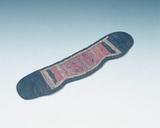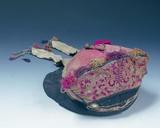"\\\"(其後字詞)無法查詢, 因為 聯合目錄 的查詢上限是256個字。
符合的藏品
共找到 108 筆符合的資料
主要題名-中文:狀元帽(分類號A2...
物紋様の剣形飄帯があり、長い尾〈長命好運〉を象徴している。 英文說明:The top of this children's hat is adorned with a piece resembling.....more
- 61/108
主要題名-中文:眉勒(分類號A28/...
名-日文:眉勒 主要題名-英文:Woman's Head Band 中文說明:明朝至清光緒年間,婦女十分流行在額頭上紮著刺繡精美的眉勒,可以裝飾、整齊頭髮,一直到清末民初,年長的婦女都還常用,本件眉勒.....more
- 62/108
主要題名-中文:風帽(分類號A28/...
's side when it reached one month or one year of age. 取得方式:台中扶輪社捐贈 材質:布 登錄號:0269 .....more
- 63/108
主要題名-中文:眉勒(分類號A28/...
要題名-日文:眉勒 主要題名-英文:Woman's Head Band 中文說明:眉勒是婦女從明朝起由包頭巾發展而來的,戴用方法是將狹長的布條從額頭往後紮起,一直到清末民初,年長的婦女都常用,眉勒上會.....more
- 64/108
主要題名-中文:帔帶風帽(分類號...
kept the child’s neck warm and was an excellent choice for protecting children playing outdoors.....more
- 65/108
主要題名-中文:碗帽(分類號A28/...
-months of age by its grandparents on the mother's side. This black flannelette example is adorned.....more
- 66/108
主要題名-中文:狀元帽(分類號A2...
:Children's hats adorned on top with a wuyu (屋宇—a peaked cover) were commonly referred to as “zhuangyuan.....more
- 67/108
主要題名-中文:帔帶風帽(分類號...
to as “wind hats,” they protected the back of children's necks and were ideal for wearing when going outside.....more
- 68/108
主要題名-中文:帔帶風帽(分類號...
the back of children's necks and were ideal for wearing when going outside in cold weather or playing.....more
- 69/108
主要題名-中文:狀元帽(分類號A2...
の外、両側と帽子の後に垂掛け糸縄結びの帯がある。 英文說明:Children's hats adorned on top with a wuyu (屋宇—a peaked cover) were.....more
- 70/108
主要題名-中文:短圈(分類號A28/...
」の吉祥寓意を表わす。 英文說明:This child's topless short hat consists of an embroidered band. Headwear.....more
- 71/108
主要題名-中文:裹腳布(分類號A2...
of binding women's feet began in China in the 10th century. Around age 4 or 5, strips of cloth were.....more
- 72/108
主要題名-中文:客家女子繡花鞋(...
類號A28/105) 主要題名-日文:客家婦女の花靴 主要題名-英文:Hakka Woman's Embroidered Shoes 中文說明:本組1雙為翹頭單梁的鉤子型繡花鞋,在底布上鑲貼菊紅色如意.....more
- 73/108
主要題名-中文:短圈(分類號A28/...
味し、また五つの小銅鏡を縫い綴って魔除けにし、両側に蝴蝶結びを縫いつけて福あることを表わす。 英文說明:This child’s topless short hat consists.....more
- 74/108
主要題名-中文:裹腳布(分類號A2...
of binding women's feet began in China in the 10th century. Around age 4 or 5, strips of cloth were.....more
- 75/108














